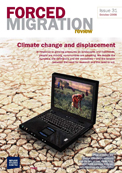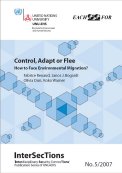Harvard Law School has just published the second issue of thier semi-annual Harvard Environmental Law Review. The issue includes the article Confronting a Rising Tide: A Proposal for a Convention on Climate Change Refugees, which is authored by Harvard Law School lecturers Bonnie Docherty and Tyler Giannini. This is an excellent piece which advocates for formal recognition and protection of those who cross international borders when displaced by climate change. It also provides several advances in regards to the field.
Quoted from the introduction:
“This Article proposes a new legal instrument to confront the issue of climate change refugees. It defines climate change refugees as people whom climate change forces to relocate across national borders.
…
It provides a more in-depth examination of a climate change refugee legal instrument that draws on multiple areas of the law, including human rights, humanitarian, and international environmental law. It looks to legal precedent to provide models and support for its proposals, yet it adapts or departs from this precedent when appropriate to tackle the unique problem of climate change. The Article also crafts an original definition of climate change refugee, details a different combination of components for a binding instrument, and calls for implementing these components as an independent treaty.
…
This Article analyzes the limits of the refugee and climate change frameworks and the value of developing a convention that is separate from these legal regimes.”
It is divided into six parts:
Part I – Introduction
Part II – “Both illuminates the climate change refugee problem and the gap in existing international law and locates the proposed instrument within a larger, interdisciplinary framework for dealing with climate change migration.”
Part III – “Develops a definition for climate change refugee that builds on related law and academic literature yet is designed for the circumstances of climate change.”
Part IV – “Presents and analyzes nine essential components of an effective climate change refugee instrument that provides rights and aid for affected communities while ensuring that responsibility is shared.”
Part V – “Argues that the international community should realize the proposed instrument as an independent convention.”
Part VI – Conclusion
Towards Recognition applauds and endorses this highly progressive article. It is worth having an entire read-through. Please leave any comments or questions you may have about it.



